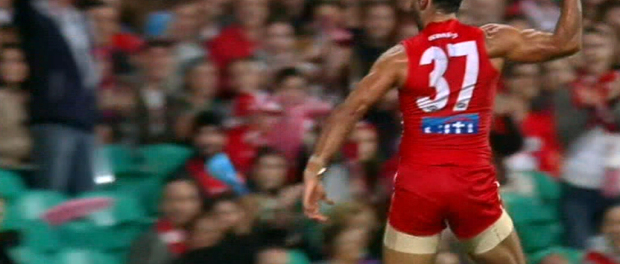Let’s make one thing clear: booing is not good for the game, whether it’s being targeted at Adam Goodes or some other player in the spectators’ sights. Players have been booed since the first ball was bounced in 1897, and they will be booed long after Goodes’ career is over, despite the AFL’s indignation. It’s never been pretty.
Players leaving clubs, staging for free kicks, being too bloody good, belting the opposition – these are all common reasons behind why blokes like Judd, Selwood, Watson and other champions cop it regularly. But what of Goodes? Shrugging the mass booing off as just racist simplifies the problem, yet at the same time, disregarding the racial element completely would also be an oversight.
This whole saga is another familiar chapter in Indigenous relations marked by the same error over generations: a failure of both parties to recognise what’s happening on the other side.
It’s true that some spectators boo for frivolous reasons, and a player’s racial background has nothing to do with it. No doubt, there are boisterous loudmouths in the stands who see nothing of race in their dislike for Adam Goodes. He’s a dual Brownlow medallist with a high profile, and this can grind the gears of opposition fans. Just ask Chris Judd.
Yet since being awarded Australian of the Year in 2014, and in the wake of the incident with the 13 year old spectator, Goodes’ presence on the football field represented something more than a player in a Sydney jumper, but a figure that transcended sport and touched on more sensitive issues surrounding the nature of our society, both historically and culturally.
Goodes is no longer just a footballer, but a political symbol with the power to divide as much as unite, such is the nature of politics. Herein lies the issue. As a country, we struggle to deal with our past and a great many of us are ignorant of the present in regard to our first peoples. Adam Goodes, by his rhetoric and actions, represents a reminder of that struggle, and it makes some of us uncomfortable.
Politics lecturer and The Project host Waleed Aly made an interesting point on this issue when it first presented some months ago. With typical insight, Aly observed: “…it’s about the fact that Australia is generally a very tolerant society until its minorities demonstrate that they don’t know their place. And at that moment, the minute someone in a minority position acts as though they’re not a mere supplicant, then we lose our minds. And we say, ‘No, no, you’ve got to get back in your box here”.
Perhaps the problem is that Adam Goodes is not playing the celebratory role we expect him to play. Here’s an Aboriginal man who’s achieved great success on the sporting field, but instead of assuring us that it’s our great game uniting the country, Goodes is daring to venture beyond that veneer of nicety and challenge us to confront some deeper truths.
Instead of placating our sense of security and tolerance by humbly accepting his title of Australian of the Year, Goodes denied us the right to accept how far we’ve come in reconciliation by openly questioning our efforts to come to terms with the nation’s history and by vocally lamenting the current plight of Australia’s indigenous population.
By holding up a mirror to Australian society within the sporting heart of the nation, Goodes asked us to consider if we liked what we saw. The adversial reaction since demonstrates that many would rather take it out on the messenger.
From Goodes’ point of view, he’s utilising his position to ask more of what we can do as a society to support reconciliation and make it something more than a symbolic nod with carefully choreographed and rehearsed lines. For the football fans, they are voting with their feet in rejection of Goodes’ politicisation of our national game.
That explains the booing. It’s not so much a black and white question of whether or not people are being racist, but more a question of how we expect our public figures, especially minorities, to act in positions granting them influence. If someone dares to ask the hard questions, it’s easier to reject the questioner than to search within for answers.





